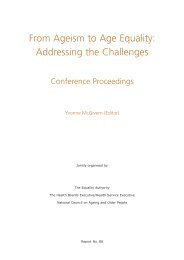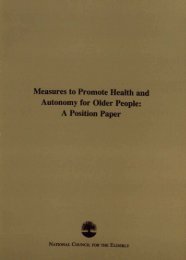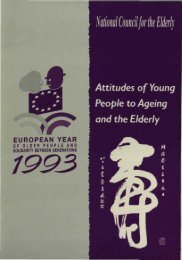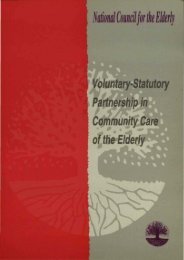Improving Quality of Life for Older People in Long-Stay Care ...
Improving Quality of Life for Older People in Long-Stay Care ...
Improving Quality of Life for Older People in Long-Stay Care ...
- No tags were found...
Create successful ePaper yourself
Turn your PDF publications into a flip-book with our unique Google optimized e-Paper software.
Men and womenTis all aged women that’s here mostlynow like. Do you know, there’s only fouror five men. (YW4 Resident 02, Private)And I stay (<strong>in</strong> the smok<strong>in</strong>g area) with(man’s name) all the time; he’s my bestfriend. And we have a chat and we readthe paper. (YW2 Resident 03, Private)Communication difficultiesWell, as I say, it’s not easy on anyonebecause I do feel awkward evensomeone talk<strong>in</strong>g to me this side(because <strong>of</strong> the deafness). They aresay<strong>in</strong>g someth<strong>in</strong>g and I say ‘I don’tknow what you are say<strong>in</strong>g really’. Theymight th<strong>in</strong>k I don’t want to talk to them,you know. (GN1 Resident 07, Public)Involvement <strong>in</strong> the decision to move <strong>in</strong>tolong-term careBecause at least the people who know they’recom<strong>in</strong>g, they’ve made the decision. They knowthey have to stay, and they get on with it.Whereas other people who are just brought <strong>in</strong>,they say you have to stay here <strong>for</strong> two weeks… they’re on edge, they want to go home. Theynever give themselves the chance to settle down,whereas the other people do and they decide tojust get on. (YW2 Resident 06, Private)Problems liv<strong>in</strong>g withresidents with dementiaIf the choice isn’t their own,then there’s hostility and thenthe little pebbles or waterwave start spread<strong>in</strong>g out –the negativity. (FG2D FocusGroup Participant)19410.5 Family and Community ConnectionsThis category focused on the extent to which residents can ma<strong>in</strong>ta<strong>in</strong> contact withhome and people from the local community (Table 10.4). Resident respondentsparticularly enjoyed visits from their family and friends. Visitors kept them updatedon what was happen<strong>in</strong>g at home, brought them gifts or other th<strong>in</strong>gs that theyneeded and helped out, <strong>for</strong> example, by do<strong>in</strong>g their laundry. More importantly, visitsfrom relatives made resident respondents feel that they were still an <strong>in</strong>tegral part<strong>of</strong> their family. Be<strong>in</strong>g consulted and <strong>in</strong>cluded <strong>in</strong> family out<strong>in</strong>gs and events wasviewed by respondents as an <strong>in</strong>dicator that they were still at the heart <strong>of</strong> the family.Opportunities <strong>for</strong> resident respondents and their visitors to have a private chatvaried across sites. Those who had a room <strong>of</strong> their own were able to meet theirvisitors <strong>in</strong> private. Alternatively, they could meet their visitors <strong>in</strong> the sitt<strong>in</strong>g room.A few facilities had tea or c<strong>of</strong>fee-mak<strong>in</strong>g facilities <strong>in</strong> the sitt<strong>in</strong>g room, enabl<strong>in</strong>gthem to <strong>of</strong>fer their visitors a cup <strong>of</strong> tea. This helped normalise the visit and make<strong>Improv<strong>in</strong>g</strong> <strong>Quality</strong> <strong>of</strong> <strong>Life</strong> <strong>for</strong> <strong>Older</strong> <strong>People</strong> <strong>in</strong> <strong>Long</strong>-<strong>Stay</strong> <strong>Care</strong> Sett<strong>in</strong>gs <strong>in</strong> Ireland















